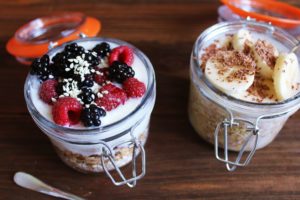Probiotics have been trending for a while. But there are probiotic supplements, probiotic foods, and prebiotic foods helping people with gastrointestinal problems. Gastroenterologists share information about how probiotics can help their patients, specifically those with Crohn’s disease.
What probiotics are:
By definition, a probiotic is a microorganism introduced into the body for its beneficial qualities. Probiotics that we are referring to are living microorganisms such as bacteria and yeast. Some patients see improvements with the digestive bacteria in their gut.
Crohn’s disease is an inflammatory disorder which affects the gastrointestinal tract. People with Crohn’s disease experience a handful of digestive problems. Probiotics may alleviate patients of the symptoms of this condition.
Probiotics can be purchased, but they tend to be a bit pricy. Some are sold in the refrigerated section advertised as “live”. Many dietitians recommend getting probiotics from kefir or yogurt. Discuss the best route for trying probiotics with your gastroenterologist.
Benefits for patients with Crohn’s disease:
According to Medical News Today, people with Crohn’s disease have an altered microbiome. This means that the digestive bacteria in their gut is unbalanced. Experts stand beside the use of probiotics to relieve people of Crohn’s disease symptoms.
These experts share that by adding healthful bacteria to the digestive tract, you can reduce intestinal inflammation. You can also reduce abnormalities of the immune system. You may do this by adding natural probiotic food to your diet, not just by taking a supplement.
Probiotic foods:
 By adding natural probiotic food to your diet, you could minimize symptoms of Crohn’s disease. Some of these symptoms include gastrointestinal irritation, diarrhea, and upset stomach. Doctors often encourage patients with Crohn’s disease to keep a food diary when experiencing symptoms.
By adding natural probiotic food to your diet, you could minimize symptoms of Crohn’s disease. Some of these symptoms include gastrointestinal irritation, diarrhea, and upset stomach. Doctors often encourage patients with Crohn’s disease to keep a food diary when experiencing symptoms.
Likewise, when adding natural probiotic foods or supplements to your diet, keep a food diary. Note any improvements in symptoms. Examples of probiotic foods include:
- yogurt
- kombucha
- kefir
- sauerkraut
- kimchi
- tempeh
- miso
- pickles
- other fermented vegetables
Sauerkraut, kombucha, kimchi, and tempeh are good options for vegans. Prebiotic foods can be introduced into your diet for possible alleviation as well. By definition, a prebiotic is a non-digestible food ingredient that promotes the growth of beneficial microorganisms in the intestines.
 Prebiotic foods include leeks, onions, and asparagus. Although there has been plenty of report, there has not been enough research thus far to prove probiotics in food can help reduce Crohn’s disease symptoms. Because of this, you may lean towards trying a probiotic supplement first.
Prebiotic foods include leeks, onions, and asparagus. Although there has been plenty of report, there has not been enough research thus far to prove probiotics in food can help reduce Crohn’s disease symptoms. Because of this, you may lean towards trying a probiotic supplement first.
As the result of research, people with IBD should eagerly reap the benefits of probiotics. Some studies show that it is no more than a placebo in treating Crohn’s disease. Speak with your gastroenterologists if probiotics are an option for you.
One researcher states that taking a high-dose, multi-strain, and refrigerated probiotic greatly impacted a 36 year old suffering with severe Crohn’s disease. Researchers are now examining the use of probiotics to treat eczema, infant colic, liver disease, the common cold, and diarrhea.
Probiotics helping people many:
Yes, we have seen a great deal of improvement for people with gastrointestinal problems. But there are also many who benefit from probiotics. Doctors often say, your skin reflects what is happening beneath the surface.
Acne is associated with an unhealthy diet or is hereditary. People with psoriasis are always looking for new research that might better their skin condition. A large amount of research is connecting the imbalance of bacteria in the gut and and psoriasis, along with other inflammatory diseases.
Probiotics influence the body to stimulate cells that regulate inflammation. A 2018 study done on mice showed a link between probiotics and skin conditions. Lactobacillus salivarius LA307 and Lactobacillus rhamnosus LA305 are specific probiotics that may prevent chronic skin inflammation.
In healthy people, adding probiotics has little to no side effects. However, in people with weakened immune systems, probiotics may cause harm. Probiotics should be discussed thoroughly with your gastroenterologist and all other physicians before adding them into your routine.Probiotics in people with weakened immune systems can cause systemic infections.
Thank you for stopping by and reading this week’s probiotic blog. We hope you check in next week for more useful gastroenterology information. Make an appointment with Gastroenterology Consultants of Central Florida to discuss if probiotics are right for you!
Staff Writer
